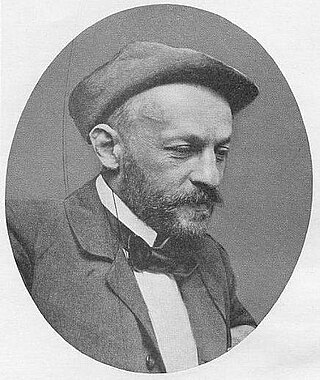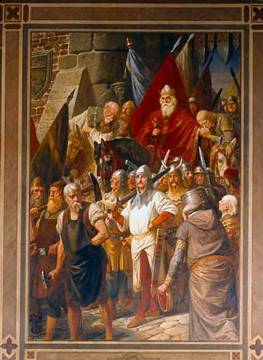
Karl Krumbacher was a German scholar who was an expert on Byzantine Greek language, literature, history and culture. He was one of the principal founders of Byzantine Studies as an independent academic discipline in modern universities.

Franz Pfeiffer, was a Swiss literary scholar who worked in Germany and Austria.
German studies is the field of humanities that researches, documents and disseminates German language and literature in both its historic and present forms. Academic departments of German studies often include classes on German culture, German history, and German politics in addition to the language and literature component. Common German names for the field are Germanistik, Deutsche Philologie, and Deutsche Sprachwissenschaft und Literaturwissenschaft. In English, the terms Germanistics or Germanics are sometimes used, but the subject is more often referred to as German studies, German language and literature, or German philology.

The Kaiserchronik is a 12th-century chronicle written in 17,283 lines of Middle High German verse. It runs from Julius Caesar to Conrad III, and seeks to give a complete account of the history of Roman and German emperors and kings, based on a historiographical view of the continuity of the Roman and German successions. The overall pattern is of a progression from pagan to Christian worlds, and theological disputations stand at the turning-points of the Christianization of the Empire. However, much of the material is legendary and fantastic, suggesting that large sections are compiled from earlier works, mostly shorter biographies and saints' lives.
Orendel is a Middle High German epic poem. Composed of around 4,000 lines, it is traditionally dated to the end of the 12th century. The earliest known manuscript (1477) was lost in a fire in 1870.

The Annolied is an Early Middle High German poem in praise of Archbishop Anno II of Cologne. Anno died in 1075 and the poem, probably written in the years immediately after his death, can be seen as part of a campaign for his canonisation, which was finally achieved in 1183.

Ludwig Traube was a German paleographer and held the first chair of Medieval Latin in Germany while at the University of Munich. He was a son of the physician Ludwig Traube (1818–1876), and the brother of the chemist Margarete Traube (1856–1912).

Iwein is a Middle High German verse romance by the poet Hartmann von Aue, written around 1200. An Arthurian tale freely adapted from Chrétien de Troyes' Old French Yvain, the Knight of the Lion, it tells the story of Iwein (Yvain), a knight of King Arthur's Round Table. It was written after Hartmann's Erec, and is generally taken to be his last work.
Victor Emil Gardthausen was a German ancient historian, palaeographer, librarian, and Professor from Leipzig University. He was author and co-author of some books; editor of ancient texts.

Gustav Gröber was a German Romance philologist.
Middle High German literature refers to literature written in German between the middle of the 11th century and the middle of the 14th. In the second half of the 12th century, there was a sudden intensification of activity, leading to a 60-year "golden age" of medieval German literature referred to as the mittelhochdeutsche Blütezeit. This was the period of the blossoming of Minnesang, MHG lyric poetry, initially influenced by the French and Provençal tradition of courtly love song. The same sixty years saw the composition of the most important courtly romances. again drawing on French models such as Chrétien de Troyes, many of them relating Arthurian material. The third literary movement of these years was a new revamping of the heroic tradition, in which the ancient Germanic oral tradition can still be discerned, but tamed and Christianized and adapted for the court.

Under the law of the Holy Roman Empire, a Landfrieden or Landfriede was a contractual waiver of the use of legitimate force, by rulers of specified territories, to assert their own legal claims. This especially affected the right of feuding.
The Zeitschrift für deutsches Altertum und deutsche Literatur is a quarterly peer-reviewed academic journal in the field of German studies with emphasis on the older periods. It was established in 1841 and is the oldest periodical in early Germanic studies still publishing.

Edward Schröder was a Germanist and mediaevalist who was a professor at the University of Göttingen and published editions of numerous texts.
Arthur Hübner was a German philologist. He specialized in research of German literature from the Middle Ages.
Odd Einar Haugen is professor of Old Norse Philology at the University of Bergen, Norway. He was born and grew up in Lunde, Telemark, but moved to Bergen in 1973 when he began his studies at the university. He is not related to the American linguist Einar Haugen.
Heinrich Rückert was a German historian and Germanist. He was the son of orientalist and poet Friedrich Rückert (1788–1866).
Die Nibelungenklage or Die Klage is an anonymous Middle High German heroic poem. The poem describes the laments for and burial of the dead from the Nibelungenlied, as well as the spread of the news of the catastrophe that ended the other poem, and the fates of the various characters who survived. It was likely written at around the same time as the Nibelungenlied, and is appended to it as though it were another episode (âventiure).
Rudolf Henning was a German philologist who specialized in Germanic studies.

Klaus von See was a German philologist who specialized in Germanic studies.